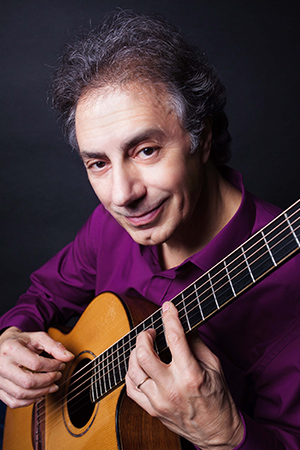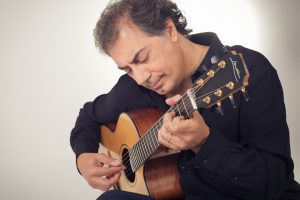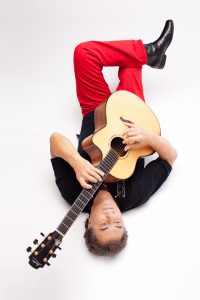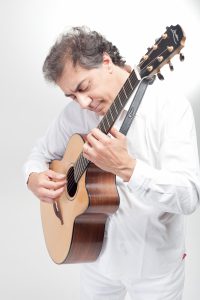Pierre Bensusan
musicality matters most!

“What is very important is to remember that the aim is not to play guitar, it’s to play music.”
~ Pierre Bensusan
Pierre Bensusan is an acoustic artist with few peers. He respects technique, of course, but regards it as necessary vocabulary and tools with which to find the – the story in the music. This is how he writes. It’s also how he teaches. If you get the chance, experience him up close during his 2017 tour.
artist details
Website: pierrebensusan.com/
Favorite Guitar: Lowden
Touring: Watch him
Heros: Paco de Lucia, Egberto Gismonti.George Benson, John McLaughlin, Ralph Towner, Jimi Hendrix
AL What’s the most important thing about playing and writing?
PB What is very important is to remember people that the aim is not to play guitar, it’s to play music. So it’s not because you know how to play guitar that you’re going to know how to write music, those are two different things.
AL Do you value being praised for your “musicality” more than technical virtuosity?
PB Absolutely! Who cares about someone technically brilliant? In fact, what you see is not the technique, especially if you have your eyes closed, and you listen, you don’t need to see, your eyes become your ears. So the technique, we need a lot of technique, it’s like vocabulary. We need a lot vocabulary in order to express ourselves, to express an opinion, the mind, to go deep into-to being precise about what you feel, what you want to transmit.
You try to solve an issue, and you work in order to resolve it, and you create the new word in your vocabulary of technique. And so the technique is only there to help you to transcend something that you want to express. The thing is, anytime, in order for the technique to be in yourself, you need to repeat it, you need to work your physical memory, your audio memory, until you have it inside, and you forgot that it’s inside, but the music will remember where to go, to take it, if it needs it, yeah?
AL If you could choose three songs to introduce your music, what would they be?
PB “So Long Michael” and “The Alchemist” from my live record called “Encore”. Those versions are live and I prefer them to the studio versions. And the one called “Feeding the Birds”, where I whistle as well and I use a loop. I don’t use a loop anymore, but at that time I used a loop to record a chord progression and then I was playing a solo on top of it.
AL You speak with great passion about your approach to teaching.
 PBOf course, you cannot do what you do without passion, and it’s not only about passion, because the passion is the drive. It’s the engine – it gives the fuel. But you need also to spend time. You need to validate things. You need to cultivate your memory. You need to repeat things until they are really enrooted, and so your need to work your physical memory, your audio memory, your situational memory. When you have the time, then all the questions you ask find their response.
PBOf course, you cannot do what you do without passion, and it’s not only about passion, because the passion is the drive. It’s the engine – it gives the fuel. But you need also to spend time. You need to validate things. You need to cultivate your memory. You need to repeat things until they are really enrooted, and so your need to work your physical memory, your audio memory, your situational memory. When you have the time, then all the questions you ask find their response.
AL On giving time to time
PB It’s very hard to grab our attention for more than five minutes, it seems like in this world today. It is totally the other way around then to enter in the music world where you have to be so patient, so tenacious, so within the moment, but also within time. You need to give time to time, if you want a fast result, go and play the stock market, don’t play music. You see what I’m saying?
AL On the magic of it all
PB The instrument is only a way to get to that place that we call music, that we cannot really define, but that I want to think that we recognize it when we hear it. We don’t know why, but we do know we are addressing something special, that sometimes we say “magical,” you know. It is, in fact. We can analyze it, we can look at what is there that makes it work, we can look at what is missing that makes it not work, that doesn’t make it work, but we cannot explain why music- what it is.
AL Where is home?
PB One hour East of Paris. It’s a little village, 200 people live here. I could not live in a big city anymore. When we were young, my wife and I used to live downtown Paris. We had this tiny apartment that we loved. Then wanted to have a family and to have a recording studio, a dancing studio. The only way was to have a house and to move out. No way we could afford to stay in Paris and have that!
AL On using your ear to tune
PB The first thing we do is to put the digital tuners back in the knapsack and we don’t see the tuner at all for a week. People can use their ears, because if you cannot use your ear for tuning, why would you assume that you can use your ears, the same ears that you don’t trust, to play music and to listen to what you play? You know what I mean? It’s very interesting to see that people lack this confidence in their own ability to listen, so this is something that we do address.
AL What do we need to “un-learn”?
PB Sometimes, faster musicians are a bit left in the desert, you know? They have cultivated a strong motivation, a strong drive, but they have a lot “un-education”. Like myself, because I’m self-taught, so I know exactly what I’m talking about. I’ve been learning things, but I have also just spent time to “un-learn” what I learned. And so I try to, in fact, help those people to optimize their time, and to optimize what they know, and to transform their desire into something tangible, which is going to be music, at the end of the day.
a
AL How would you describe your residential workshop students?
PB I have people coming from all over, from Australia, Japan, China, of course United States, all over Europe, France. So it’s very interesting, because the groups are totally multicultural, multi-ethnic, and people are all together. They share the same passion for music and the same inhibitions sometimes. And after one day they start to be so friendly together, so comprehensive, so open to each other.
AL What do you mean by “re-educating your ears?”
PB It’s an instrument, we are talking about the instrument, so the agenda to transpose music on an instrument is the same for every musician. It does require you to listen carefully, profoundly, deeply, analytically, precisely, and to remember. Your ears become like a tape recorder that not only remembers melody, harmony, chords, notes, but also the pitch, the tonality. You start to re-educate your ears so that your ear becomes extremely sharp, very very sharp. We were talking about tuning, but, in fact, when people tune their guitar they essentially tune themselves. In order to tune correctly, you need to be tuned in yourself. And so a lot of people are totally not aligned when they start tuning, this is why they lack confidence, and use [digital] tuners. The thing is that a tuner will never be as accurate as your ear can be.
AL Do you tour with one guitar? 
PB I’ve been touring with one guitar, my old Lowden that George [Louden] built for me in 1978. The guitar is just so amazing. It’s an elixir of sound, and for this guitar -it’s like coming home. If a guy was saying to me “I’ll give you half a million dollars for this guitar,” I don’t even think I would sell it. I can’t. You cannot sell your friend, who is the confidante of all your emotions. You can’t, there’s no price. And it’s a sound, the sound has no price. You cannot put a price on such a good muse, you cannot buy everything.
AL Talk to me about a few of your acoustic heroes.
PB Paco de Lucia, for instance, that’s maybe the most important one, but there is another guy from Brazil who is Egberto Gismonti. I also love George Benson. I love John McLaughlin, Ralph Towner, Jimi Hendrix. There are so many players. Of course, I mention only guitar players, there are composers like Bach, Beethoven, Handel, Debussy, Faure. I love those people, you know. I grew up listening to them. It’s amazing to see the commitment that they had. It was a mythical commitment that goes beyond everything.
AL How old were you when you started?
PB I was six when I played the piano, six or seven, and the guitar I think I was 11.
AL Do you remember your first acoustic guitar?
PB Yes! It was a guitar given to me by my father, who was a big fan of Django Reinhardt. I didn’t know what to do with it, so it stayed in the cabinet for several months, collecting dust, until a friend of mine from school saw it. I didn’t even know how to tune it, I didn’t know how to change strings.” So he went out, bought strings, told me how to tune it and showed me a few chords – and that was it. That’s my guitar teacher, the guy from school. He has been my only official teacher, everything else I found by myself, listening to other people.
AL What do you enjoy most about performing?
PB I love performing for people, because I grew up from there. It’s something which for me is a growing experience all the time, it’s endless. I feel I play better when I play for people, and I feel also that you are in a very unique community experience. Nothing comes close to this. For me, I need to have the audience, to have the urgency of the commitment with the audience, to feel them, sometimes to even look at some eyes in the audience, for the magic to trigger, you know.
AL If you could see one acoustic show this year, who would it be?
PB Take 6. I would love to see them again, I saw them in Paris. When I said “acoustic” – those six guys sing, that’s all they do. A Capella. Cannot be more acoustic than that.
AL What causes are you passionate about?
PB There are many out there. From the top of my head, anything which goes in the direction of acceptance, of tolerance, of sharing, of rescuing people, helping others, all those causes are for me. They’re extremely important and we should help them. 

